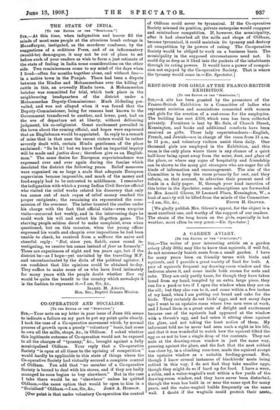CO-OPERATION AND SOCIALISM.
[To THE EDITOR OF THE " SPECTATOR." J SIR,—Your note on my letter in your issue of June 6th seems to indicate a failure on my part to put my point quite clearly. I took the case of a Co-operative movement which, by normal process of growth upon a purely " voluntary " basis, had come to own all the mills, shops, &c., in Oldham. I asked whether this legitimate outcome of Co-operation would not be exposed to all the charges of "tyranny," &c., brought against a fully municipalised Oldham. Your reply that a Co-operative Society "is open at all times to the uprising of competition" would hardly be applicable to this state of things where the Co-operative Society had virtually secured a complete control of Oldham. You add that "no member of a Co-operative Society is bound to deal with his stores, and if they are badly managed he soon begins to buy elsewhere." But in the case I take there would be no "elsewhere" unless he quitted Oldham,—the same option that would be open to him in a
"Socialised" Oldham.—I am, Sir, &c., Joni; A. Honsom. [Our point is that under voluntary Co-operation the control
of Oldham could never be tyrannical If the Co-operative Society misused its position, private enterprise would reappear and reintroduce competition. If, however, the municipality, after it had absorbed all the mills and shops of Oldham, became tyrannical, it could maintain its tyranny and destroy all competition by its powers of rating. The Co-operative Society would be obliged to work on a business basis. The municipality in the supposed circumstances need not. It could dip as deep as it liked into the pockets of the inhabitants through its rating powers. It would have a power of compul- sion not enjoyed by the Co-operative Society. That is where the tyranny would come in.—ED. Spectator.]






































 Previous page
Previous page